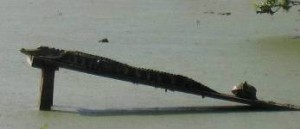If you are a “knowledge worker” this becomes even more important. Walking in the regenerative arms of nature is especially useful. Epiphanies of all sorts and bursts of inspiration come to us in moments of relaxation. This does not let you off the hook in terms of making the actual effort to see exactly how to let your insight take shape in the world, be it through writing, experimenting or engineering a model. What is at work here is the cognitive benefit of focused attention on a problem, interspersed with an entirely different activity that lets the subconscious mind gnaw away on its own for a while.

Alligator at Audubon Swamp. Photo by H. Hutchinson
Myself, I like to take dawn walks in the Audubon Swamp. Friends that come to visit me are often dragged out there to see the light come up over the cypress and tupelo trees growing directly from the water. I have to say their initial reaction to the idea of “walking in the swamp” is usually dismay or horror. They envision trekking through thigh high muck swarming with alligators and water moccasins. I explain that actually it is a beautiful place with a boardwalk not even requiring special shoes, and yes, there are indeed alligators and water moccasins, but you are highly unlikely to encounter them directly, though you may see them sunning on a ramp.

Yellow Rump
This time of year, the swamp is alive with migrating birds and ducks. Hundreds of yellow-rump (or my daughters’ preferred term “butter-butts”) warblers, blue and green winged teal, pie-billed grebe, and assorted other migratory fowl find haven there on the way south for the winter. Although there are 80-100 alligators living under the water, you are likely to only see 1-2 small ones during this season trying to get warm.
The swamp is a place where no one demands anything of me: no phones, no email, no need for conversation. My mind wanders freely over any number of issues. How to help a client that feels trapped; what to write in this month’s newsletter; whether I should be financially helping my recently unemployed daughter; or even what I have at home to eat for dinner. Some of my most inspired ideas have come during this free time.
William Wordsworth expert Simon Bainbridge, professor of Romantic studies at Lancaster University, believes the poet can be viewed as a “management guru for the 21st century.” So, since 2007, the professor has been taking anyone willing to pay a small fee on walks through the Lake District in England for reflective time. Says Christopher May, associate dean for enterprise in Lancaster’s Faculty of Arts and Social Sciences, “Although some people laugh at the idea of learning from poetry, the courses can be useful to anyone who needs to think about the future rather than just the day to day.”
College professors know that sabbaticals provide valuable time to focus on their research, but often by the time they are able to obtain a sabbatical, they are burnt out from the stress of meeting everyday demands. The most often complaint heard about sabbaticals from both the professors taking them, and the schools granting them, is that, “So-and-so was supposed to write a book during that time, but there is nothing to show for it.” Instead of waiting for a big break, take time now even with the hectic demands of everyday life. Rejuvenate regularly to help clear your mind for strategic and innovative thinking.
One professor I know who practices what I preach cleverly named his boat so that he could put the following message on his answering machine: “Thank you for contacting me. I am currently out on Sabbatical.” Love it! I am also in favor of “technology holidays.” I take Sundays off from the computer. A “socially acceptable convention for absence” says Cathy Davidson, co-director of the PhD lab in Digital Knowledge, is to set up an away message. Check out the Sabbath Manifesto for more on unplugging.
The amazing thing about taking this kind of restorative time (after beating yourself up for not getting enough done) is just how much time will slow done for you. Not in actuality, of course, since there are never more than 24 hours in a day, but your sense of it. Focusing more on the present moment expands your sense of the time available. As you slow down, so does your perception. Time seems to expand. Take a look at Steve Taylor’s blog, The Speed of Life: Why Time Seems to Speed Up and How to Slow it Down (2007):
A … way in which we can slow down time is by making a conscious effort to be ‘mindful’ of our experience. There are some people who seem to be as affected by familiarity than others, and see the world with something of the fresh, first-time vision of children all through their lives. These are the kind of people – sometimes seen as eccentrics by those around them – who often begin sentences with phrases like ‘Isn’t it strange that…?’ or ‘Have you ever wondered…?’
In this season of quietude approaching the winter holidays, it makes a great deal of sense to quit rushing around and give ourselves permission to wander, watch and wonder. You just might end up with an incredible insight that changes the world.








ok, sign me up! By the way, I did water colors all morning (very relaxing but absolutely no talent!) Finished another book yesterday.
Pingback: Finding your third place to disconnect from home and work - Transitioning Your Life